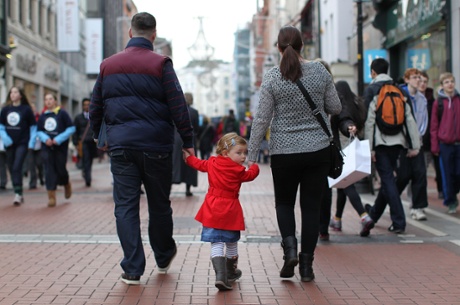Today on the Streetsblog Network, James Kennedy at Transport Providence brings up an experience he had recently that's likely to be familiar to many younger community activists -- the "you-don't-have-kids-yet-so-you-don't-matter" brushoff:

I was talking to a mid-level Providence official about the need to reform the city's transportation priorities away from car use, and he interjected that the reforms I was proposing would be fine for people like me who are "young, carefree, and without children" but that that comprised only a narrow segment of the population.
The really frustrating thing, Kennedy writes, is that he's struggling with barriers to parenthood that wouldn't be so imposing if his city was easier to navigate without a car:
Personally, though, I would like to be a parent by this point in my life. Rachel and I talk about it at least a couple times a week. We both feel that way, but we look at our finances in this economy and don't feel that we can afford to. And when I say that we can't afford it, I don't mean that we've saving up for the fancy preschool we want our perfect trust fund baby to attend, or trying to get the right footing in our power careers. I mean that we question whether we would be able to afford basic nutrition and healthcare for a baby in anything approaching a consistent way.
I get irritated by the implication that not having children makes my opinion less valid, not because I don't agree that parenthood is difficult or know that it carries lots of challenges I don't yet face, but because the implication is also that I'm a selfish person, with a narrow life, and somehow not a full adult yet. I must not have children because I'm a selfish Millennial or Hipster (it turns out that the economic trend of being poor and riding a bicycle may not be as rare is we are told).
Of course, the official knew something I didn't know. Before 1950, there were no children. Everyone was born fully grown with male pattern baldness and interesting moustaches. They wore trousers made of scratchy wool and rode velocipedes and trolley-trams and never had to pick anyone up from school or buy groceries or do anything stressful. It was a Victorian Paradise. And then cars came, and people suddenly had someplace to conceive, and so children came onto the scene...
I feel like we have a value in the United States which says that cars are the way we do things, and then we try to adjust everything we do to that preconceived position. While someday I expect that I may find it useful to get a drivers' license and use a car occasionally, I actually plan on carrying out my parenting duties mostly without a car. That's the way my great-grandparents did it. It's halfway how my grandparents did (they were each single-car households). And now car use is declining again. The ironically named Baby Boom generation is really a blip on the radar screen, even within modern times.
We've grown up with a baseline reality that says that cars are the tool that people use when they have more responsibility than themselves. So we understand that students might not drive, or perhaps some old people. We even make the allowances for the poor people, who we figure are marginal and don't matter. But we need to expand our vision beyond this. When someone expresses their desire that we start treating cars and not children as marginal, they're not being utopian. It's the other way around.
Elsewhere on the Network today: The Transportationist attempts to define the "post-modern era" in transportation. And Strong Towns shows how far local governments will go to pay for roads that probably should never have been built in the first place.





